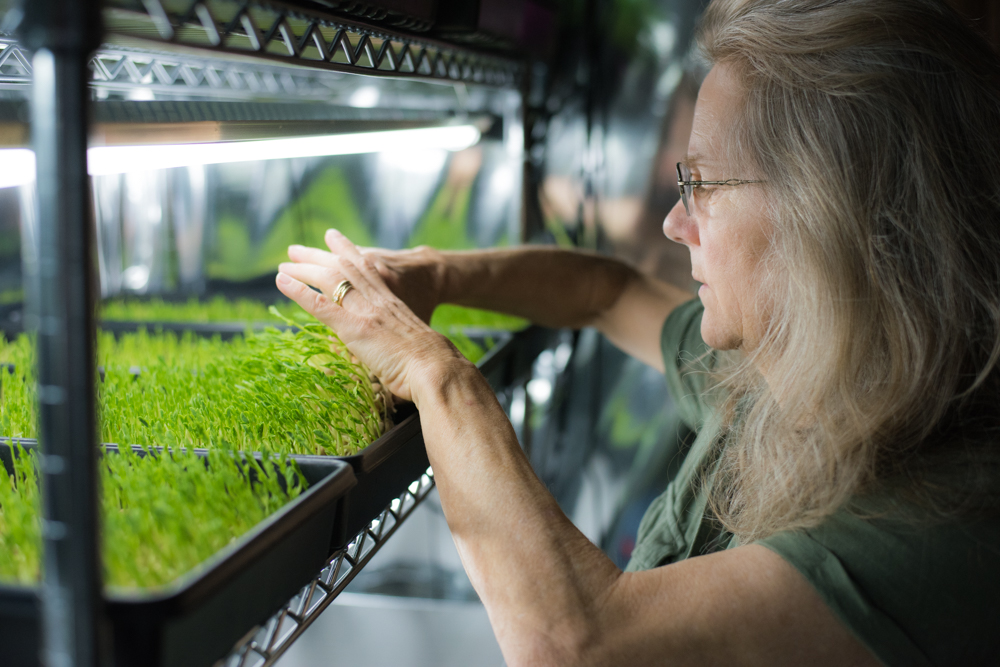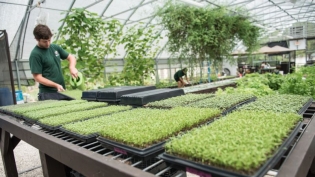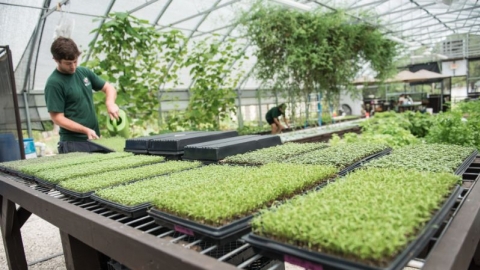Lynn Wettach's Small Plants and Big Plans
Starting the Farmers' Market at the St. Augustine Amphitheatre in 1997, Lynn Wettach played a significant role in highlighting the importance of connecting people to those who grow the food we eat. Now, as the owner of Veggie Confetti Farm, Lynn has become a vital component in the supply chain of the local food system. Her passion for hands-on experience growing food began as a child on her family's farmstead, and if she only had a few more hours in the day, she might just accomplish everything on her ever-growing to-do list.
Veggie Confetti is a newer operation in St. Augustine. How did you come to open a hydroponics farm in this area?
I have always wanted to have a small farm. My son, an executive chef in Baltimore, knew I was interested in hydroponics and enjoyed eating microgreens and shoots. While visiting, he introduced me to an indoor microgreen grower in the heart of downtown Baltimore. I did a great deal of research, visited several other indoor microgreen farms and within a few months Veggie Confetti Farm was up and growing. It is a pleasure growing for Chefs who are very appreciative of the quality of our crops. I am grateful Veggie Confetti Farm can play a small part in the composition of their incredible dishes.
What's your background? How did you learn about hydroponics?
I was raised in farm country in the Finger Lakes Region of Upstate NY. My parents' 4 acre homestead gave me an opportunity to experience country life first hand. We tapped maple trees and made syrup, pressed apples from our trees and made cider, and had a huge garden. Growing up as I did instilled in me an appreciation of small farms along with the desire to have one of my own. By visiting other hydroponic farms and doing extensive research on the internet, I was able to learn the methods I now use on the farm.
You started the farmers' market at the St. Augustine Amphitheatre. What led you to open that, and did you anticipate it would become such a huge draw on Saturday mornings?
Yes, I did open the Old City Farmers' Market in 1997. It is my belief that small family farms are vital to this nation. It was my desire to offer a consistent marketplace where farmers were able to sell their crops for a fair price, foster close relationships between farmers, consumers and the community, and educate the public regarding the importance of the family farm. It is wonderful that it is thriving and the community comes out every week to support the farmers.
What's the most challenging part of farming small in Northeast Florida?
I would have to say the weather; at least for me. Gardening conventionally in FL has been a challenge, so indoor hydroponics has been the perfect solution. We talk a lot about seasonal ingredients and consumers, chefs, restaurants, artisans and farms working together as a "food system."
What are some of the hurdles you face in trying to get your product to market?
Actually, there have not been many obstacles other than not enough hours in the day. There is so much more I would like to do; reach out to more restaurants, attend more farmers' markets, and teach others how to operate an indoor vertical farm but I just can't seem to find the time. I'm grateful to be so busy and our farm is thriving!
What do you believe is the potential for hydroponics in our region -- and what is its biggest challenge?
Hydroponics is a great way to farm in Florida. Our farm is different from most since we farm vertically, indoors, and are completely self-contained. Hand watering our crops uses 80 - 90% less water than conventional farms. There are several large hydroponic farms in NE Florida which are growing and expanding each year due to the local demand for their products. They also use far less water and less land to produce the same amount of crops. I believe more and more farms such as these will be the farms of the future. This system alleviates many of the problems of greenhouse hydroponic farms such as bugs and dealing with the heat and humidity in the summer.
Finally -- what advice would you give to women who are interested in working on, working with, or owning, a small farm?
For those wishing to own their farm; go for it! The best place to start is to work on a farm. You will quickly learn if farming is really in your future. If it is; find your property, do your research, make sure there is a market for your farm products, and get started. There is a great deal of information on the internet and others who are willing to offer advice. Take advantage of every opportunity to learn how to farm. It is a great deal of work but also extremely rewarding.







